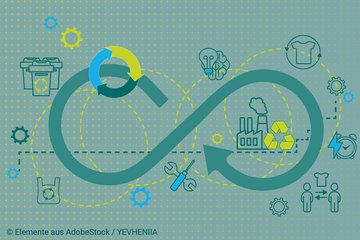
Sustainability and Individual Liberty
What role for private law and PIL?
The principles of individual liberty and economic growth were fundamental to the development of modern private law in the nineteenth century. Today, however, with the climate crisis and loss of biodiversity looming, it looks untenable to keep chasing quantitively-measured growth that depends on unlimited exploitation of resources. “It’s time for a re-evaluation in private law”, Ralf Michaels, director at the Institute, says. “We have to shift our focus from liberty toward responsibility, away from growth and toward stability.”
Sustainability has long been a normative keyword. Equally clear is that the associated values and aspirations can only be achieved in an environment of transnational co-operation. The United Nations established sustainable development as a global ideal in 1992; how significant are private law, and private international law in particular, to achieving it? “It was many years before scholars here saw any real connection,” Michaels says. In 2021, Michaels co-edited The Private Side of Transforming our World, a collection of articles by authors from around the world examining the PIL issues surrounding each of the seventeen goals the United Nations put forth in its 2030 Agenda for Sustainable Development. It was received with great interest internationally, because it filled a void, which for Michaels suggests a major potential for long-term study.
The Role of Private Law
Our lifestyle based on natural resource extraction, global trade, creative destruction and waste generation is anything but sustainable, and nearly all of it happens on a private-law footing. Take the food we consume every day, brought to us by numerous economic actors, with licensing deals and proprietary rights, who control everything, from production and various supply chains to purchase at checkout at your local supermarket. The United Nations Conference on Trade and Development (UNCTAD) has valued global trade volume for 2022 at a record-setting 23 trillion US dollars. Every transaction in that estimate reflects a private-law relationship.
Global Participation
Well before the publication of The Private Side of Transforming our World, Michaels and co-editors Verónica Ruiz Abou-Nigm and Hans von Loon had been laying the foundation for a global collaborative study, and their call for papers in 2018 found global resonance, which led to the book project. The authors delivered their contributions in Hamburg in 2021 at a hybrid conference split between in-person attendees and a widely strewn global audience.

“We have to shift our focus
from liberty toward responsibility,
away from growth and toward stability.”
– Institute director Ralf Michaels –
The individual authors addressed a wide range of transnational private-law topics, including access to justice, freedom of contract, and recognition and enforcement of judgments in connection with the social and ecological accountability of multinational corporations. Many wrote about issues involving the proliferation of digital platforms, including internationally accessible “e-health” services, or the fact of local housing being repurposed for mass tourism. The conference and publication have fostered an international network of scholars and a second generation of projects. This shows the political relevance and rule-making potential inherent in PIL, a discipline long perceived as merely technical and rigidly formal.
Focus on Regions
“There are several dimensions to the question of what private international law means for sustainable development,” Michaels says. “We have completed a preliminary global survey, and now we are trying, among other things, to look at the very disparate conditions regionally in which we have to think about sustainable development, which applies primarily to the countries of the global south.” So far, there have been opportunities to revisit and tailor the book’s findings to regional particularities at conferences in Asunción and Medellín, the proceedings of which have already been published. Work is also underway on a special issue of the Chinese Journal of Transnational Law dedicated to topics such as regional migration, international environmental damage, and sustainability in global supply and value chains. Another project is addressing similar issues in the African context, with research to appear in the Nigerian Journal of Sustainable Development Law and Policy. These broad assessments of the situation in Asia, Africa and Latin America are generating comparative legal analysis of issues first formulated in connection with the global conference.
A Fresh Look at the Basics
Michaels sees an additional dimension in the possibility that examining PIL from the perspective of sustainability could reveal something fundamentally new about the entire discipline. “Classically, the function of coordination has been one of the basic tools of private international law”, he says. “Achieving the sustainable development goals engages two additional functions of private international law: one of regulation, and one of facilitation, both of which derive from substantive private law.”
“Traditionally, private law has been viewed as a locus
for private self-organization, which makes it remote
from the existential questions of our time.”
– Institute director Ralf Michaels –
How to unpack this? Well, norms that serve a regulatory purpose usually have a protective function. For example, some rules of private international law protect the economically weaker party to certain kinds of transactions, such as the employee or the consumer. The effects of such unequal bargaining power are often more serious in the transnational than in the domestic context. There are also special rules that protect people from cross-border environmental harms. But Michaels says the facilitative function must be better utilized if PIL is to help us achieve sustainability. Contract and property rights, for example, could be more robust and easier to enforce across borders and could serve sustainability better and more efficiently in that context.
A Radical Reorientation
“Much of the legitimacy of private autonomy rests on holders of property and contract rights reaping benefits for themselves without negative impacts on others. But practically, it is inconceivable to receive benefits like this without costs. Private law silently externalizes those costs, which is to say, it imposes them on others, the others in particular being the global south, ecosystems, and future generations,” Michaels says of the dilemma.
What about legal constraints on the enjoyment of property to benefit the greater good? The fundamental private-law regulatory mechanism of liability in torts and contracts comes in where one person’s enjoyment of property rights has a negative impact on others. Public-law interventions such as the right to repair or expanded duties of manufacturers modelled on the circular economy also have their place. However, these mechanisms are more or less only enforceable domestically, Michaels says, and so their effectiveness is no match for an ecological crisis on the scale of what humanity is facing. Instead, Michaels advocates for an approach at the foundation of private autonomy. “We have to radically reorient ourselves toward circular contractual relationships and toward property rights as rights of accountability”. And Michaels has this to say about calls for public-law interventions to steer us toward sustainability: “Traditionally, private law has been viewed as a locus for private self-organization, which makes it remote from the existential questions of our time. But we cannot simply cast the burden of sustainability onto public law. We need a reorientation in private law as well, and urgently.”
Header und Portrait Ralf Michaels:
© Max Planck Institute for Comparative and International Private Law / Johanna Detering












